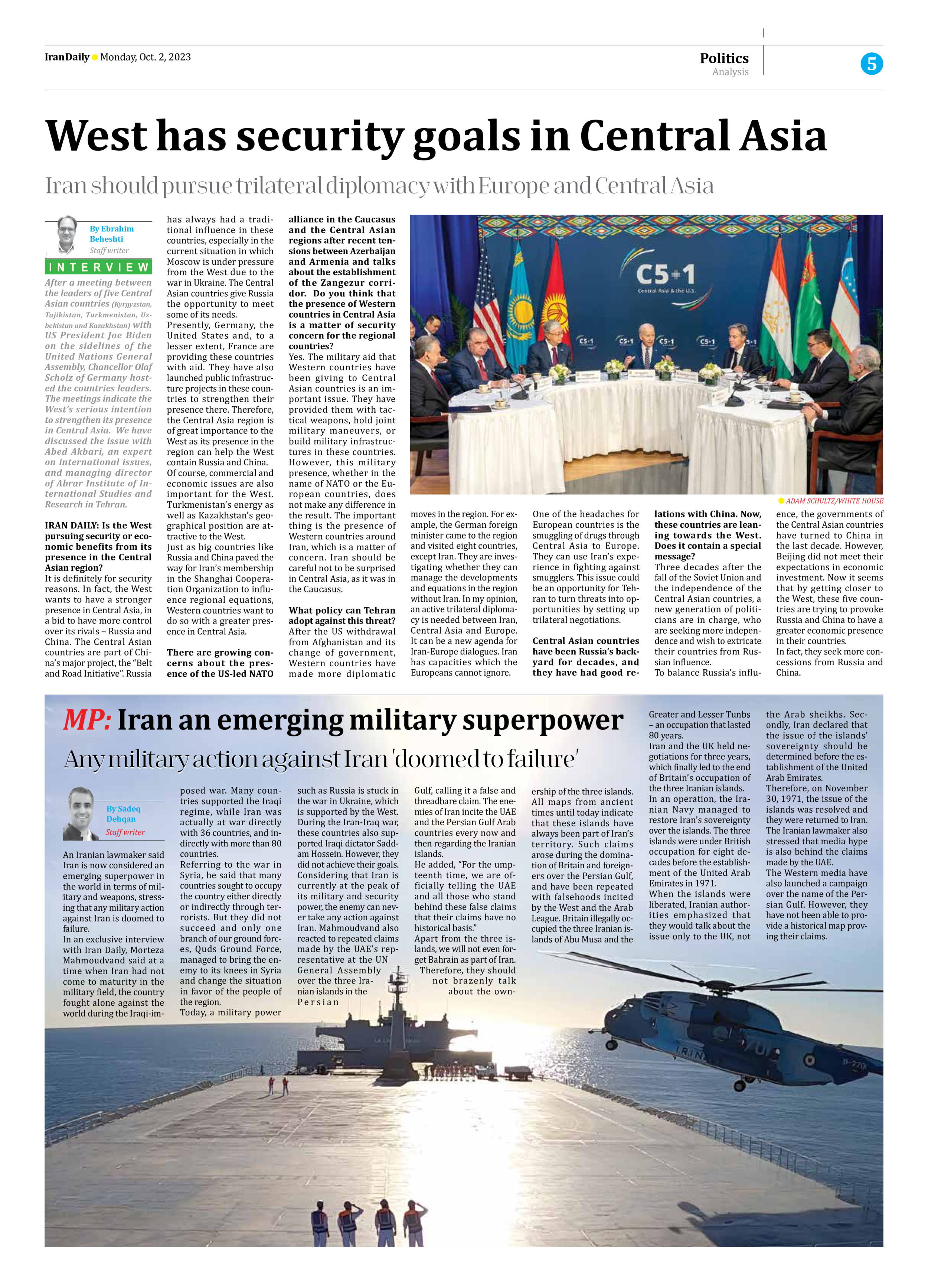
West has security goals in Central Asia
Iran should pursue trilateral diplomacy with Europe and Central Asia
By Ebrahim Beheshti
Staff writer
After a meeting between the leaders of five Central Asian countries (Kyrgyzstan, Tajikistan, Turkmenistan, Uzbekistan and Kazakhstan) with US President Joe Biden on the sidelines of the United Nations General Assembly, Chancellor Olaf Scholz of Germany hosted the countries leaders. The meetings indicate the West’s serious intention to strengthen its presence in Central Asia. We have discussed the issue with Abed Akbari, an expert on international issues, and managing director of Abrar Institute of International Studies and Research in Tehran.
IRAN DAILY: Is the West pursuing security or economic benefits from its presence in the Central Asian region?
It is definitely for security reasons. In fact, the West wants to have a stronger presence in Central Asia, in a bid to have more control over its rivals – Russia and China. The Central Asian countries are part of China’s major project, the “Belt and Road Initiative”. Russia has always had a traditional influence in these countries, especially in the current situation in which Moscow is under pressure from the West due to the war in Ukraine. The Central Asian countries give Russia the opportunity to meet some of its needs.
Presently, Germany, the United States and, to a lesser extent, France are providing these countries with aid. They have also launched public infrastructure projects in these countries to strengthen their presence there. Therefore, the Central Asia region is of great importance to the West as its presence in the region can help the West contain Russia and China.
Of course, commercial and economic issues are also important for the West. Turkmenistan’s energy as well as Kazakhstan’s geographical position are attractive to the West.
Just as big countries like Russia and China paved the way for Iran’s membership in the Shanghai Cooperation Organization to influence regional equations, Western countries want to do so with a greater presence in Central Asia.
There are growing concerns about the presence of the US-led NATO alliance in the Caucasus and the Central Asian regions after recent tensions between Azerbaijan and Armenia and talks about the establishment of the Zangezur corridor. Do you think that the presence of Western countries in Central Asia is a matter of security concern for the regional countries?
Yes. The military aid that Western countries have been giving to Central Asian countries is an important issue. They have provided them with tactical weapons, hold joint military maneuvers, or build military infrastructures in these countries. However, this military presence, whether in the name of NATO or the European countries, does not make any difference in the result. The important thing is the presence of Western countries around Iran, which is a matter of concern. Iran should be careful not to be surprised in Central Asia, as it was in the Caucasus.
What policy can Tehran adopt against this threat?
After the US withdrawal from Afghanistan and its change of government, Western countries have made more diplomatic moves in the region. For example, the German foreign minister came to the region and visited eight countries, except Iran. They are investigating whether they can manage the developments and equations in the region without Iran. In my opinion, an active trilateral diplomacy is needed between Iran, Central Asia and Europe. It can be a new agenda for Iran-Europe dialogues. Iran has capacities which the Europeans cannot ignore.
One of the headaches for European countries is the smuggling of drugs through Central Asia to Europe. They can use Iran’s experience in fighting against smugglers. This issue could be an opportunity for Tehran to turn threats into opportunities by setting up trilateral negotiations.
Central Asian countries have been Russia’s backyard for decades, and they have had good relations with China. Now, these countries are leaning towards the West. Does it contain a special message?
Three decades after the fall of the Soviet Union and the independence of the Central Asian countries, a new generation of politicians are in charge, who are seeking more independence and wish to extricate their countries from Russian influence.
To balance Russia’s influence, the governments of the Central Asian countries have turned to China in the last decade. However, Beijing did not meet their expectations in economic investment. Now it seems that by getting closer to the West, these five countries are trying to provoke Russia and China to have a greater economic presence in their countries.
In fact, they seek more concessions from Russia and China.







